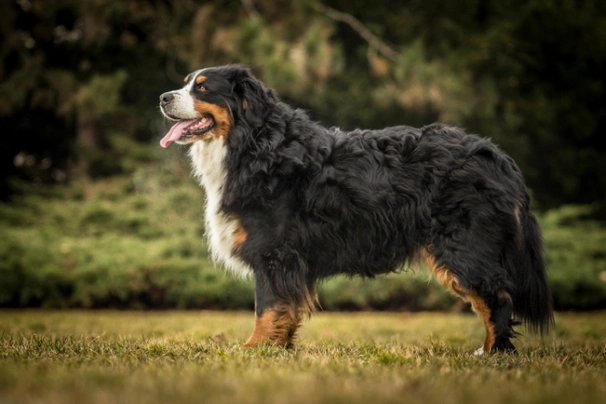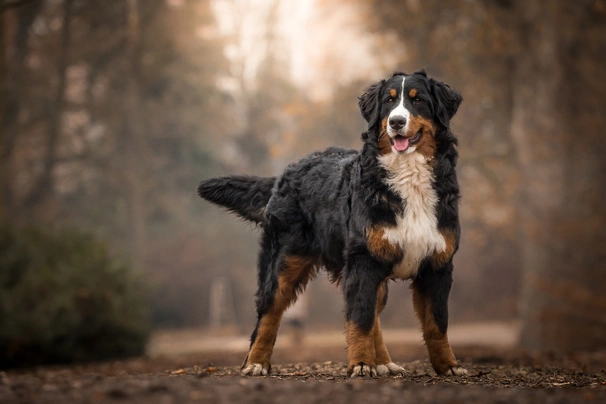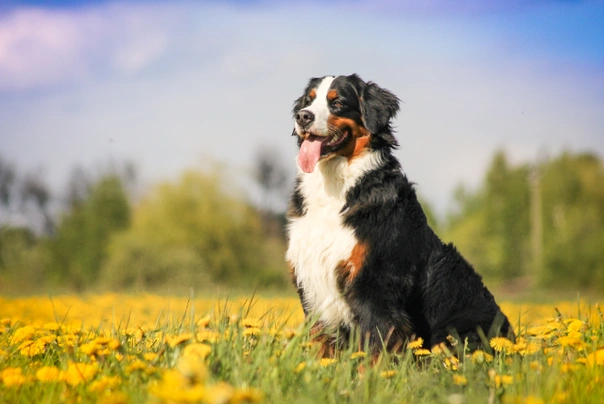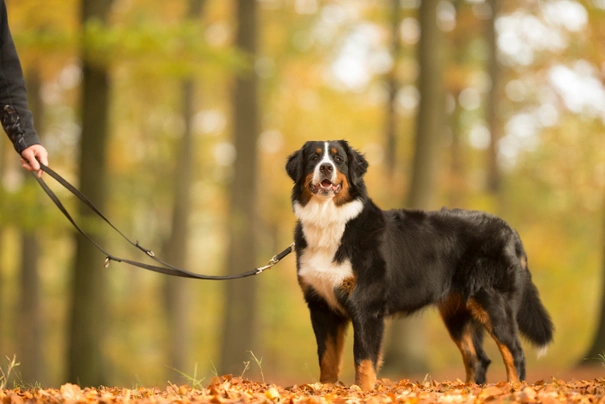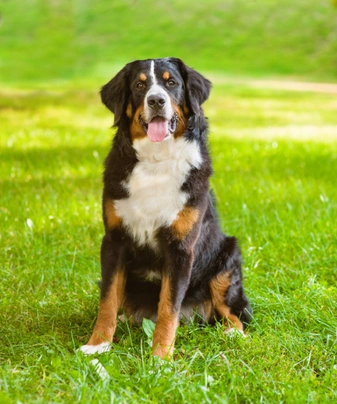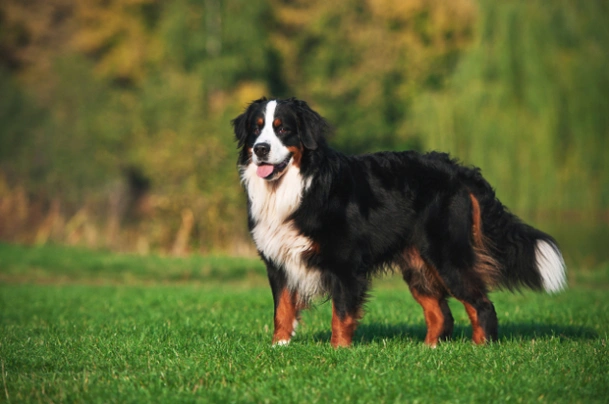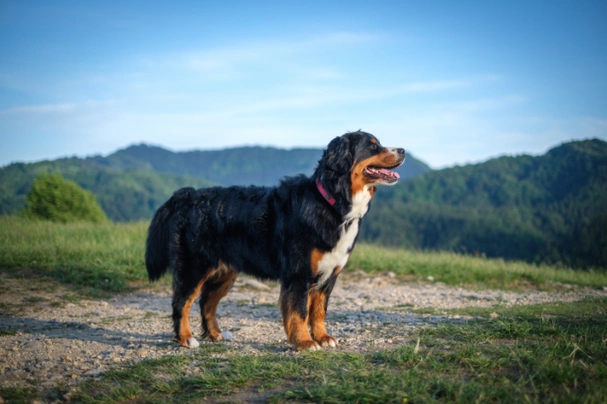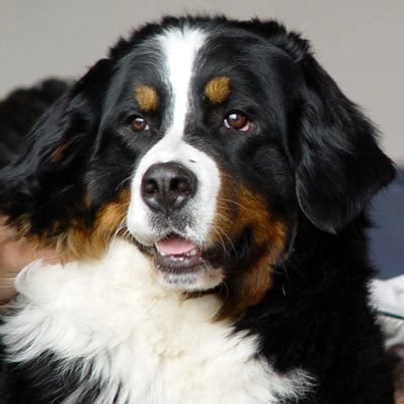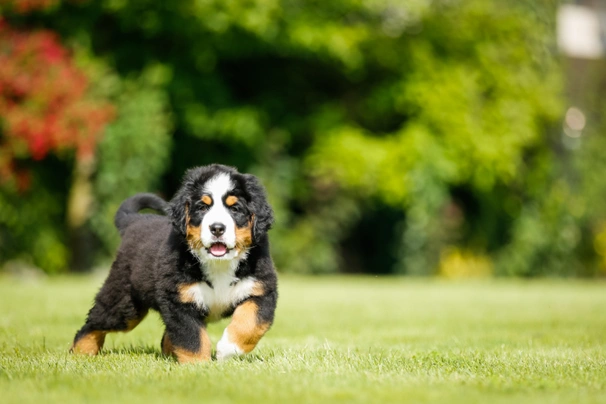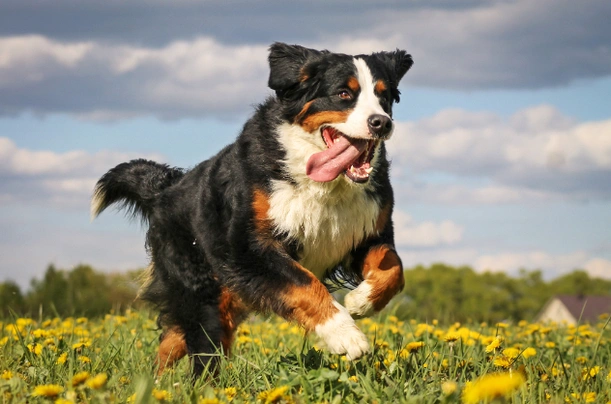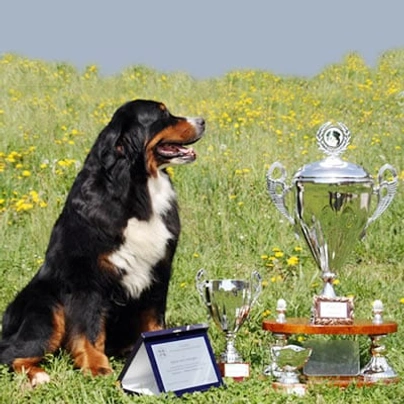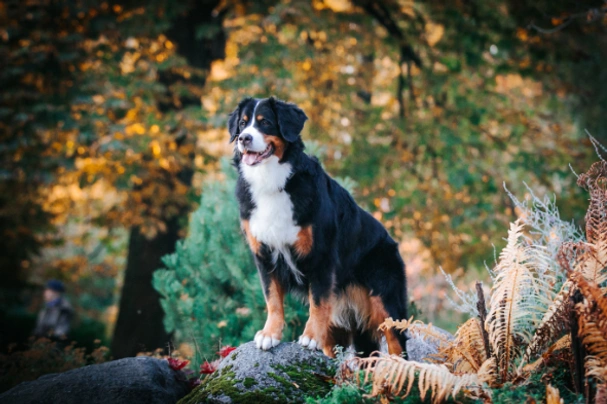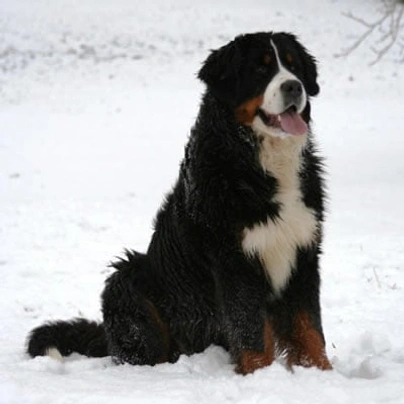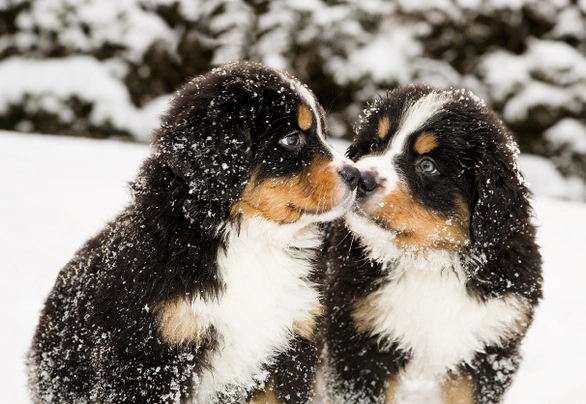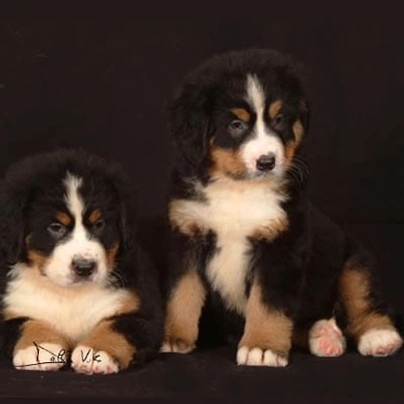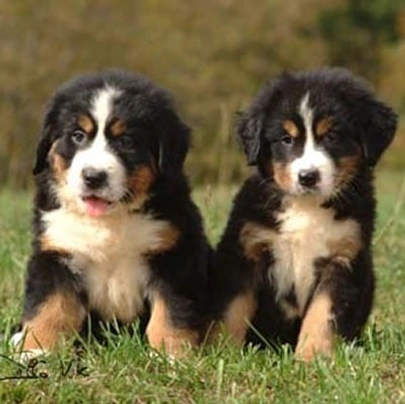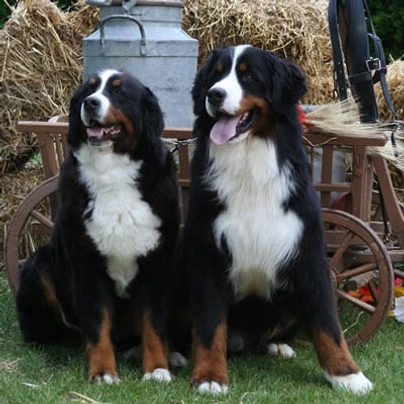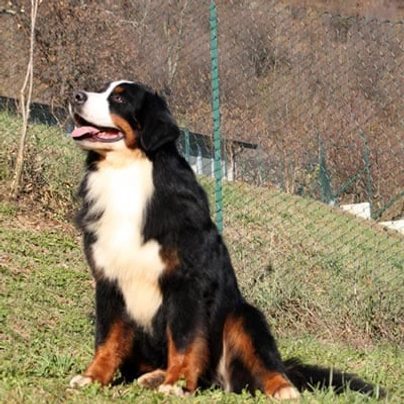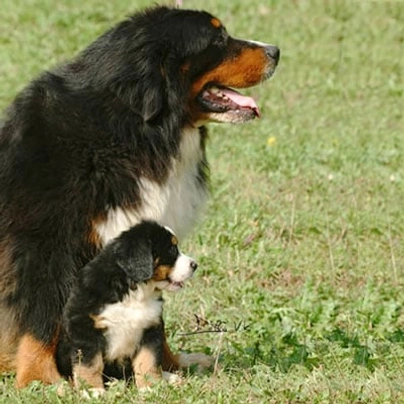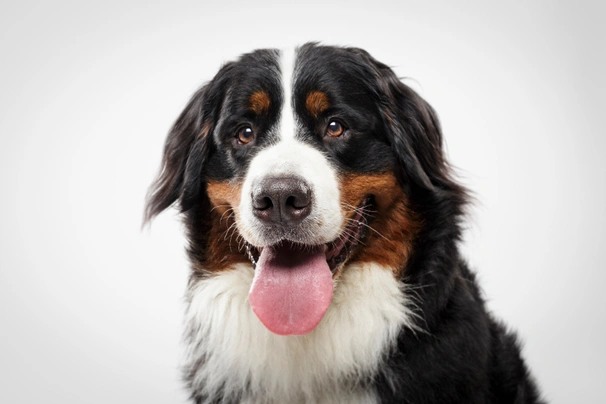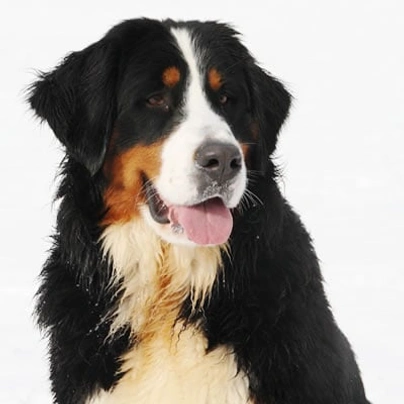Bernese Mountain Dog
Pros
Cons
Introduction of the Bernese Mountain Dog
The Bernese Mountain Dog hails from Switzerland where they are highly prized not only as companions and family pets but as working dogs too. In their native land they are classed as Sennenhunds and are known to be true gentle giants being especially good around children of all ages. Always eager to please the BMD is known to be loyal and affectionate characters by nature and boast being among the most intelligent dogs on the planet which means they are easy to train. The Bernese is an extremely handsome dog with their lovely tricolour coats which is one of their defining physical traits.
They are a great choice for first time dog owners but they do need to be given lots of daily exercise as well as mental stimulation to be truly happy well-balanced characters. Then there's the cost of keeping a Bernese Mountain Dog which works out more expensive than other breeds all thanks to their large size.
History of the Bernese Mountain Dog
The Bernese Mountain Dog is thought to have an ancestry that dates to Roman times when this type of dog was used to herd cattle through the Alps as armies marched through the lands. They belong to a group of dogs called “Sennenhund” of which there are three other types in the group with the BMD being the second largest. As these dogs became popular in different regions of their native Switzerland each community developed a specific type of dog to suit their needs. As such four types of Sennenhund were created which are the Entlebucher the smallest dog of this type the Appenzeller which is slightly bigger the Bernese and lastly the Great Swiss Mountain Dog which is the largest of them all.
Early in the 20th century Professor Heim a huge fan of the breed worked hard to promote and establish the dogs we see today stating that "the Bernese Mountain Dog is the loveliest dog to be found anywhere" all thanks to their loyalty alertness and affectionate natures whether in a working or home environment. With this said the Bernese as a breed has its roots in the Berne canton which is the region of Switzerland where they were highly prized herding dogs used in high alpine pastures where large herds grazed. They were also used to pull milk carts and as rescue dogs when there were avalanches.
Today the Bernese Mountain Dog is renowned not only for being a superb working dog in their native Switzerland but they are also highly regarded as loyal devoted companions and family pets throughout the world thanks to their sweet kind reliable and docile natures being especially tolerant with children and other animals.
Interesting facts about the breed
- Is the Bernese Mountain Dog a vulnerable breed? No they are among some of the more popular breeds in the UK and elsewhere in the world. They rank 97 out of 238 other breeds on the Pets4homes website
- They are the 2nd largest of the Swiss mountain dog breeds known as Sunnerhunds
- The Bernese is often confused for the Pyrenean although they are two very distinct breeds
- They mature slowly only reaching full maturity when they are around 2 to 3 years old but they reach their full height when they about 15 months old
- The Bernese Mountain Dog is renowned for being a good judge of character and love nothing more than to "people watch"
Appearance of the Bernese Mountain Dog
Height at withers: Males 64 – 70 cm Females 58 – 66 cm
Average weight: Males 35 – 55 kg Females 35 – 45 kg
Bernese Mountain Dogs are large being the second biggest of the four Sunnerhunds working dogs. They are quite similar looking to a Golden Retriever only heavier and they boast a stockier build. They are attractive dogs with a personality that matches their sturdy good looks. However it's their lovely colouring that really makes these dogs stand out from the crowd.
These dogs boast striking features with a well-defined stop over a straight strong muzzle. Their eyes are almond-shaped and dark brown in colour. Ears are medium in size and triangular and they are set high on a dog's head. When relaxed their ears lie flat but when alert or excited dogs raise them slightly pointing forward.
A Bernese boasts a strong jaw line with a perfect scissor bite where they upper teeth neatly overlap their lower ones. Their necks are muscular and strong being medium in length. Forequarters boast being well-muscled long with sloping shoulders which are at a very distinct angle. Their front legs are straight and well boned. These dogs are compact looking with shorter rather than longer bodies. They boast a broad chest and a nice deep brisket with well-defined ribcages and strong powerful loins and a firm and level back going to a smooth well-rounded rump.
Their hindquarters are strong and broad being well-muscled and their back legs are well developed. Their feet are compact short and round. The Bernese boasts a bushy tail which they raise when working or alert but which they never curl over their backs.
When it comes to their coat Bernese Mountain Dogs boast a silky and soft coat that has a natural sheen. Their hair is long and slightly wavy showing no curl at all. As previously mentioned the BMD boasts a smart and attractive coat which is jet black with dogs having reddish markings on their cheeks over their eyes as well as on their chests and all four legs. They also have a very striking white blaze and white markings on their chests giving them a very distinguished look. Dogs also have white paws although some don't which is also acceptable as a breed standard. The accepted breed colour for Kennel Club registration is as follows:
- Tricolour
Gait/movement
When a Bernese Mountain Dog moves they do so with a far reaching easy stride. Each step they take being well balanced while covering a lot of ground at all paces.
Faults
The Kennel Club frowns on any exaggerations or departures from the breed standard and would judge the faults on how much they affect a dog's overall health and wellbeing as well as their ability to perform.
Males should have both testicles fully descended into their scrotums and it is worth noting that a dog can be a little lighter or heavier as well as slightly taller or shorter than set out in the Kennel Club breed standard which is given as a guideline only.
Temperament of the Bernese Mountain Dog
The Bernese Mountain Dog is known to be a highly intelligent character and one that is a pleasure to be around. They are a good choice for first time owners providing people have the time to spend with their canine companions because they need a lot in the way of exercise mental stimulation and grooming. Being such large dogs the BMD also needs the space to move around and they do not tolerate being left on their own for long periods of time especially when still young which can lead to dogs suffering from separation anxiety.
With this said once a Bernese has been walked they are more than happy to relax when they get back home and are known to be wonderfully quiet loving nothing more than to spend a few hours dozing all the while keeping a close eye on what's going on around them.
Bernese Mountain Dogs usually reach their adult height when they are around 15 months old but they take a lot longer to reach full maturity which can take anything from 2 to 3 years. They are known to be fun-loving characters but if not well socialised at a young age and trained correctly they can become a little boisterous and unruly behaviours that can be hard to correct further down the line.
However when well-handled and correctly trained these dogs boast calm reliable and even temperaments showing a lot of loyalty and affection as well as patience towards their owners and more especially towards younger members of a family. They relish being part of the family and like nothing more than to be involved in everything that goes on in a household and are renowned for being “people watchers”.
Are they a good choice for first time owners?
Because the Bernese boasts such a lovely stable temperament they are a great choice for first time dog owners being especially good around children of all ages. They thrive in a home environment without ever being too demanding which makes these gentle giants so endearing to share a home with.
What about prey drive?
The Bernese is a very social character by nature and even though they were originally bred as herding dogs they do not have a very high prey drive. However this is not to say that a dog would not give chase to a smaller animal when the mood takes them and this includes squirrels and the cat from next door whenever the chance arises.
What about playfulness?
Bernese Mountain Dogs have a very playful side to their natures and love to entertain and be entertained. They enjoy playing interactive games with children and are especially patient and tolerant when the kids are around although playtime can get a bit boisterous more especially when a Bernese is still young.
What about adaptability?
A Bernese needs to have enough space to express themselves and are therefore better suited to living in a house with a secure back garden where they can roam whenever possible. As such they are not well suited to apartment living.
What about separation anxiety?
The Bernese hates being left on their own for longer periods of time which is why they are better suited to families where at least one person stays at home when everyone else is out so they typically always have company. This is especially true of puppies and younger dogs bearing in mind that a Bernese matures very slowly only really reaching full maturity when they are anything between 2 to 3 years old.
What about excessive barking?
The Bernese Mountain Dog is not known to be a "barker" but should any strangers or visitors arrive at the door they are always quick to let an owner know about it before settling down again. In short a Bernese only typically barks for good reason and not just for the sake of it.
Do Bernese Mountain Dogs like water?
Some Bernese love swimming and will take to the water whenever they can more especially when the weather is hot whereas others do not like going in water at all. Anyone who owns a dog that does not like water should never force them to go in because it would just end up scaring them. With this said care should always be taken when walking a Bernese Mountain Dog off the lead anywhere near more dangerous watercourses just in case a dog decides to leap in and then needs rescuing because they can't get out of the water on their own.
Are Bernese Mountain Dogs good watchdogs?
The Bernese is a real "people watcher" and as previously mentioned they are renowned for being good judges of character. With this said a Bernese would always be quick off the mark to let an owner know when something they don't like is going on in their environment but once satisfied that all is well they soon settle down again. In short the Bernese is a reliable watchdog and a breed that goes about their business without showing any sort of aggressive behaviour.
Intelligence / Trainability of the Bernese Mountain Dog
The Bernese Mountain Dog is intelligent and they always like to please which makes them quite easy to train but their education needs to start early because if left until a dog is older it can result in a Bernese being a little too boisterous and unruly making it harder to handle such a large dog. Puppies must be well socialised from a young age too for them to grow up to be confident characters bearing in mind that the Bernese Mountain Dog is a very sensitive character by nature and does not like being shouted at.
The key to successfully training a Bernese is to start their education early and to always be consistent. It's best to keep training sessions interesting and short which helps keep a puppy or young dog focused on what is being asked of them. All Bernese puppies are incredibly cute which means it is all too easy to spoil them when they first arrive in their new homes. However owners need to start out as they mean to go on and this means laying out rules and boundaries so that puppies understand what is acceptable behaviour and what is not. The first commands a Bernese puppy should be taught are as follows:
- Come
- Sit
- Stay
- Quiet
- Leave it
- Down
- Bed
Children and other
As previously mentioned the Bernese Mountain Dog is known to be a real gentle giant always calm and placid especially when children are around. They adore the company of people and this includes kids. However because of their large size it's always best to make sure any interaction between a dog and children is supervised by an adult so that things don't get too boisterous which could result in a toddler getting knocked over.
In general the BMD tolerates other animals and is good around them rarely do these dogs show any sort of aggressive behaviour. However they do need to be well socialised from a young age to be truly well-rounded so they get on with cats and other small pets commonly kept in the home**.** As with any other breed introductions to pets and other animals a Bernese does not already know should be done carefully so that things go smoothly.
Health of the Bernese Mountain Dog
The average life expectancy of a Bernese Mountain Dog is between 7 to 8 years when properly cared for and fed an appropriate good quality well-balanced diet to suit their ages.
In general these dogs are healthy characters but like so many other pure breeds the BMD is prone to suffer from a few hereditary health issues which are worth knowing about if you are planning to share your home with one of them. The health issues most commonly seen in the breed include the following:
- Degenerative Myelopathy (DM)
- Hip dysplasia - DNA test available
- Elbow dysplasia - DNA test available
- Malignant Histiocytosis or Systemic Histiocytosis (MH or SH or Histio)
- Osteochondrosis - often referred to as “Osteo” or “OCD”
- Hypomyelinogenesis (Trembler)
- Bloat/gastric torsion
Other health issues known to affect the Bernese
The Bernese Mountain Dog is one of the breeds that is predisposed to suffering from heat stroke thanks to their black coats. As such care should always be taken as to how long a dog stays out in the sun during the hotter summer months.
Some Bernese can develop eye issues with the most common being entropion and ectropion. However reputable breeders would never use a dog that has suffered from either condition in a breeding programme which reduces the risk of their offspring from inheriting these eye problems.
More about bloat/gastric torsion
Because they are prone to suffering from bloat it is best to feed a Bernese Mountain Dog several smaller meals a day rather than fewer large ones which reduces the risk of a dog developing this life-threatening condition.
What about vaccinations?
Bernese puppies would have been given their initial vaccinations before being sold but it is up to their new owners to make sure they have their follow-up shots in a timely manner with the vaccination schedule for puppies being as follows:
- 10 -12 weeks old bearing in mind that a puppy would not have full protection straight away but would be fully protected 2 weeks after they have had their second vaccination
There has been a lot of discussion about the need for dogs to have boosters. As such it's best to talk to a vet before making a final decision on whether a dog should continue to have annual vaccinations which are known as boosters.
What about spaying and neutering?
A lot of vets these days recommend waiting until dogs are slightly older before spaying and neutering them which means they are more mature before undergoing the procedures. As such they advise neutering males and spaying females when they are between the ages of 6 to 9 months old and sometimes even when a dog is 12 months old.
Other vets recommend spaying and neutering dogs when they are 6 months old but never any earlier unless for medical reasons. With this said many breeds are different and it is always advisable to discuss things with a vet and then follow their advice on when a dog should be spayed or neutered.
What about obesity problems?
Some Bernese Mountain Dogs gain weight after they have been spayed or neutered and it's important to keep an eye on a dog's waistline just in case they do. If a dog starts to put on weight it's important to adjust their daily calorie intake and to up the amount of exercise they are given. Older dogs too are more prone to gaining weight and again it's essential they be fed and exercised accordingly because obesity can shorten a dog's life by several years. The reason being that it puts a lot of extra strain on a dog's internal organs including the heart which can often prove fatal bearing in mind that the Bernese already boasts having a short life span.
What about allergies?
Some Bernese are prone to suffering from allergies and it's important for a dog to see a vet sooner rather than later if one flares up. Allergies can be notoriously hard to clear up and finding the triggers can be challenging. With this said a vet would be able to make a dog with an allergy more comfortable while they try to find out the triggers which could include the following:
- Certain foods which contain high levels of grain and cereal fillers
- Airborne pollens
- Dust mites
- Environment
- Flea and tick bites
- Chemicals found in everyday household cleaning products
Participating in health schemes
All responsible Bernese Mountain Dog breeders would ensure that their stud dogs are tested for known hereditary and congenital health issues known to affect the breed. It is mandatory for all Kennel Club Assured Breeders to use the following schemes and other breeders are strongly advised to follow suit:
The Kennel Club also strongly advises that all breeders not breed from bitches when they are under 2 years old.
What about breed specific breeding restrictions?
Apart from the standard breeding restrictions for all Kennel Club registered breeds there are no other breed specific breeding restrictions for the Bernese Mountain Dog.
What about Assured Breeder Requirements?
It is mandatory for all KC Assured Breeders to use the following schemes and the Kennel Club strongly recommends that other breeders follow suit:
The Kennel Club also advises the following:
- Bitches under the age of 2 years old should not produce a litter
Caring for the Bernese Mountain Dog
As with other breeds Bernese Mountain Dogs need to be groomed on a regular basis to make sure their coats and skin are kept in top condition. They also need to be given regular daily exercise to ensure they remain fit and so they don’t put on too much weight. On top of this they need to be fed good quality well-balanced diet that meets all their nutritional needs throughout their lives. The other thing to bear in mind is that the cost of looking after a Bernese Mountain Dog is a lot higher than that of many other breeds thanks to their larger size.
Caring for a Bernese Mountain Dog puppy
Bernese puppies are boisterous and full of life which means it's essential for homes and gardens to be puppy-proofed well in advance of their arrival. A responsible breeder would have well socialised their puppies which always leads to more outgoing confident and friendly dogs right from the word go. With this said any puppy is going to feel vulnerable when they leave their mother and littermates which must be taken into account. The longer a puppy can remain with their mother the better although it should never be for too long either.
It's best to pick a puppy up when people are going to be around for the first week or so which is the time needed for a puppy to settle in. Puppy-proofing the home and garden means putting away any tools and other implements that a boisterous puppy might injure themselves on. Electric wires and cables must be put out of their reach because puppies love chewing on things. Toxic plants should be removed from flowerbeds and the home too.
Puppies need to sleep a lot to grow and develop as they should which means setting up a quiet area that's not too out of the way means they can retreat to it when they want to nap and it's important not to disturb them when they are sleeping. It's also a good idea to keep "playtime" nice and calm inside the house and to have a more active "playtime" outside in the garden which means puppies quickly learn to be less boisterous when they are inside.
The documentation a breeder provides for a puppy must have all the details of their worming date and the product used as well as the information relating to their microchip. It is essential for puppies to be wormed again keeping to a schedule which is as follows:
- Puppies should be wormed at 6 months old
- They need to be wormed again when they are 8 months old
- Puppies should be wormed when they are 10 months old
- They need to be wormed when they are 12 months old
Things you'll need for your puppy
There are certain items that new owners need to already have in the home prior to bringing a new puppy home. It's often a good idea to restrict how much space a puppy plays in more especially when you can't keep an eye on what they get up to bearing in mind that puppies are often quite boisterous which means investing in puppy gates or a large enough playpen that allows a Bernese puppy the room to express themselves while keeping them safe too. The items needed are therefore as follows:
- Good quality puppy or baby gates to fit on doors
- A good well-made playpen that's large enough for a puppy to play in so they can really express themselves as puppies like to do
- Lots of well-made toys which must include good quality chews suitable for puppies to gnaw on bearing in mind that a puppy will start teething anything from when they are 3 to 8 months old
- Good quality feed and water bowls which ideally should be ceramic rather than plastic or metal
- A grooming glove
- A slicker brush or soft bristle brush
- Dog specific toothpaste and a toothbrush
- Scissors with rounded ends
- Nail clippers
- Puppy shampoo and conditioner which must be specifically formulated for use on dogs
- A well-made dog collar or harness
- A couple of strong dog leads
- A well-made dog bed that's not too small or too big
- A well-made dog crate for use in the car and in the home that's large enough for a puppy to move around in
- Baby blankets to put in your puppy's crate and in their beds for when they want to nap or go to sleep at night
Keeping the noise down
All puppies are sensitive to noise including Bernese puppies bearing in mind that the Bernese is a very sensitive dog by nature that does not like being shouted at. It's important to keep the noise levels down when a new puppy arrives in the home. TVs and music should not be played too loud which could end up stressing a small puppy out.
Keeping vet appointments
As previously mentioned Bernese puppies would have been given their first vaccinations by the breeders but they must have their follow up shots which is up to their new owners to organise. The vaccination schedule for puppies is as follows:
- 10 -12 weeks old bearing in mind that a puppy would not have full protection straight away but would only be fully protected 2 weeks after they have had their second vaccination
When it comes to boosters it's best to discuss these with a vet because there is a lot of debate about whether a dog really needs them after a certain time. However if a dog ever needed to go into kennels their vaccinations would need to be
What about older Bernese Mountain Dogs when they reach their senior years?
Older Bernese need lots of special care because as they reach their golden years they are more at risk of developing certain health concerns. Physically a dog's muzzle may start to go grey but there will be other noticeable changes too which includes the following:
- Coats become coarser
- A loss of muscle tone
- Bernese Mountain Dogs can either become overweight or underweight
- They have reduced strength and stamina
- Older dogs have difficulty regulating their body temperature
- They often develop arthritis
- Immune systems do not work as efficiently as they once did which means dogs are more susceptible to infections
Older dogs change mentally too which means their response time tends to be slower as such they develop the following:
- They respond less to external stimuli due to impaired vision or hearing
- They tend to be a little pickier about their food
- They have a lower pain threshold
- Become intolerant of any change
- Often an older dog can feel disorientated
Living with a Bernese Mountain Dog in their golden years means taking on a few more responsibilities but these are easily managed and should include taking a look at their diet the amount of exercise they are given how often their dog beds need changing and keeping an eye on the condition of their teeth.
Older Bernese need to be fed a good quality diet that meets their needs at this stage of their lives all the while keeping a close eye on a dog's weight. A rough feeding guide for older dogs is as follows bearing in mind they should be fed highly digestible food that does not contain any additives:
- Protein content should be anything from 14 – 21%
- Fat content should be less than 10%
- Fibre content should be less than 4%
- Calcium content should be 0.5 – 0.8%
- Phosphorous content should be 0.4 – 0.7%
- Sodium content should be 0.2 – 0.4%
Older Bernese don't need to be given the same amount of daily exercise as a younger dog but they still need the right amount of physical activity to maintain muscle tone and to prevent a dog from putting on too much weight. All dogs need access to fresh clean water and this is especially true of older dogs when they reach their golden years because they are more at risk of developing kidney disorders.
Grooming of the Bernese Mountain Dog
To keep a BMD’s coat looking good takes a bit of work which means it's important to set up a grooming routine for them. The earlier a puppy is taught that being brushed is a nice experience the easier it is to keep on top of things when they are adult dogs. As such these dogs need grooming at least once a week but ideally they need to be brushed more often to prevent any knots and tangles forming in their coats. Like other breeds the BMD sheds more during the Spring and then again in the Autumn when more frequent brushing is necessary to keep on top of things and any loose hair off the furniture.
It's also important to keep an eye on their ears because air cannot circulate as well as it should. Moisture tends to build up in a dog's ear canal creating the perfect environment for a yeast infection to take hold. This type of infection can be notoriously hard to clear up.
Exercise of the Bernese Mountain Dog
The Bernese Mountain Dog is a large and athletic character which means they need a good two hours’ exercise daily. They also need to be given lots of mental stimulation because keeping their minds busy will fend off the chance of boredom setting in. It's important to remember they are highly intelligent dogs which in short means they need to be kept busy both mentally and physically to be truly happy well-rounded dogs.
However the BMD is a relaxed character and not demanding which means that if they are only taken on a shorter walk from time to time they would be perfectly okay with things. However these dogs do not do well when left to their own devices for too long. Puppies only need a little exercise to begin with and it's important not to overdo things because too much exercise puts extra strain on their joints ligaments and bones which are still developing. This could cause problems further down the line when these dogs are older.
With this said the breed is prone to obesity which means keeping a careful eye on a dog's waist line and to feed them according to the amount of exercise they are given to ensure they never carry too much weight.
Feeding of the Bernese Mountain Dog
If you get a Bernese Mountain Dog puppy from a breeder they would give you a feeding schedule and it's important to stick to the same routine feeding the same type of puppy food to avoid any tummy upsets. You can change a puppy's diet but this needs to be done very gradually always making sure they don't develop a digestive upset in the process and if they do it's best to put them back on their original diet and to discuss things with the vet before attempting to change their diet again.
Mature Bernese Mountain Dogs need to be fed a good quality well-balanced diet and it should be one that suits the different stages of their lives. However contrary to what you may think they don't need to be fed vast volumes of food once they have matured. Over-feeding a dog would lead to obesity and this could shorten their already short life spans considerably. It is also very important not to feed a Bernese large portions but to feed smaller ones throughout the day to reduce the risk of them suffering from gastric torsion (bloat). It’s just as important to time when a Bernese is fed and to avoid taking dogs out for a walk just after they have eaten or to feed them too soon on their return.
Feeding guide for a Bernese Mountain Dog puppy
Puppies need to be fed a highly nutritious good quality diet for them to develop and grow as they should. As a rough guide a Bernese Mountain Dog puppy can be fed the following amounts every day making sure their meals are evenly spread out throughout the day and it's best to feed them 3 or 4 times a day:
- 2 months old - 389g to 394g depending on puppy's build
- 3 months old - 399g to 504g depending on puppy's build
- 4 months old - 439g to 556g depending on puppy's build
- 5 months old - 524g to 658g depending on puppy's build
- 6 months old - 597g to 749g depending on puppy's build
- 7 months old - 599g to 756g depending on puppy's build
- 8 months old - 595g to 755g depending on puppy's build
- 9 months old - 557g to 701g depending on puppy's build
- 10 months old - 521g to 658g depending on puppy's build
- 11 months old - 476g to 613g depending on puppy's build
- 12 months old - 434g to 574g depending on puppy's build
- 13 months old - 431g to 538g depending on puppy's build
- 14 months old - 426g to 535g depending on puppy's build
Once a puppy is 18 months old they can be fed adult dog food.
Feeding guide for an adult Bernese Mountain Dog
Once fully mature an adult Bernese Mountain Dog must be fed a good quality diet to ensure their continued good health. As a rough guide an adult Bernese can be fed the following amounts every day:
- Dogs weighing 35 kg can be fed 374g to 499g depending on activity
- Dogs weighing 45 kg can be fed 394g to 519g depending on activity
- Dogs weighing 55 kg can be fed 519g to 683g depending on activity
Bernese Mountain Dog price
If you are looking to buy a Bernese Mountain Dog you would need to pay anything from £500 to over £1000 for a well-bred pedigree puppy. The cost of insuring a male 3-year-old Bernese Mountain Dog in northern England would be £57.23 a month for basic cover but for a lifetime policy this would set you back £105.34 a month (quote as of January 2018). When insurance companies calculate a pet's premium they factor in several things which includes where you live in the UK and a dog's age and whether they have been neutered or spayed.
When it comes to food costs you need to buy the best quality food whether wet or dry to feed your dog throughout their lives making sure it suits the different stages of their lives. This would set you back between £40 - £60 a month. On top of this you would need to factor in veterinary costs if you want to share your home with a Bernese Mountain Dog and this includes their initial vaccinations their boosters the cost of neutering or spaying your dog when the time is right and then their annual health check visits all of which could quickly add up to over a £1500 a year.
As a rough guide the average cost to keep and care for a Bernese Mountain Dog would be between £120 to £200 a month depending on the level of insurance cover you opt to buy for your dog but this does not include the initial cost of buying a well-bred Kennel Club registered pedigree Bernese Mountain Dog puppy.
Buying advice
When visiting and buying any puppy or dog there are many important things to consider and questions to ask of the breeder/seller. You can read our generic puppy/dog advice here which includes making sure you see the puppy with its mother and to verify that the dog has been wormed and microchipped.
Bernese Mountain Dogs are among some of the more popular breeds both in the UK and elsewhere in the world which means that well-bred puppies can often command a lot of money. As such with Bernese Mountain Dogs there is specific advice questions and protocols to follow when buying a puppy which are as follows:
- Beware of online scams and how to avoid them. You may see online and other adverts by scammers showing images of beautiful Bernese Mountain Dogpuppies for sale at very low prices. However the sellers ask buyers for money up front before agreeing to deliver a puppy to a new home. Potential buyers should never buy a puppy unseen and should never pay a deposit or any other money online to a seller. You should always visit the pet at the sellers home to confirm they are genuine and make a note of their address.
- As previously touched upon Bernese Mountain Dogs are among some of the more popular breeds in the UK. As such there are many amateur breeders/people who breed from dam far too often so they can make a quick profit without caring for the welfare of the puppies their dam or the breed in general. Under Kennel Club rules a dam can only produce 4 litters and she must be between a certain age to do so and never under the age of two. Anyone wishing to buy a Bernese puppy should think very carefully about who they purchase their puppy from and should always ask to see the relevant paperwork pertaining to a puppy's lineage their vaccinations and their microchipping.
